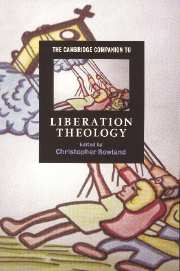Book contents
- Frontmatter
- Introduction
- Part one Contemporary liberation theology
- Part two Aspects of liberation theology
- Part three Analysis and criticism
- 8 Liberation theology and the Roman Catholic Church
- 9 Marxism, liberation theology and the way of negation
- 10 The economics of liberation theology
- 11 Political theology, tradition and modernity
- Epilogue: the future of liberation theology
- Select bibliography
- Index
8 - Liberation theology and the Roman Catholic Church
from Part three - Analysis and criticism
Published online by Cambridge University Press: 28 May 2006
- Frontmatter
- Introduction
- Part one Contemporary liberation theology
- Part two Aspects of liberation theology
- Part three Analysis and criticism
- 8 Liberation theology and the Roman Catholic Church
- 9 Marxism, liberation theology and the way of negation
- 10 The economics of liberation theology
- 11 Political theology, tradition and modernity
- Epilogue: the future of liberation theology
- Select bibliography
- Index
Summary
Medellín and the aftermath of the Second Vatican Council
It was from a situation of dependence on Europe that liberation theologians sought to free themselves. In so doing, they could call upon original tradition worth reviving. But the awareness of the tradition grew slowly. In 1968, the conventional date for the start of 'liberation theology' in the modern sense, the stress fell on what was new. The Latin American bishops, meeting at Medellín, made the crucial move. How was the Christian doctrine of 'salvation' to be presented in terms that would be intelligible to the suffering peoples of Latin America? 'Salvation' always implies a metaphor, whether of restoration to health after sickness or 'redemption' from slavery. The Latin American bishops decided that the best translation of 'salvation' for their oppressed peoples was liberation. To be meaningful, however, they would have to stand with their oppressed peoples. The phrase 'option for the poor', first used in a letter from Pedro Arrupe to the Jesuits of Latin America in May 1968, expressed this truth.
‘Liberation theology’ came into being to expand on and explain these two insights. Its originality consisted in the fact that it was not just a theology about liberation, as the theology of ‘grace’ was about grace. It was for liberation, promoting and propagating it. Likewise, it was not just a theology about the poor, it was theology for the poor. So it would be an active practical theology intended to make a difference in the real world: the Marxist concept of praxis indicated that. The stress of liberation theology lay as much on orthopraxis (right action) as on orthodoxy (right thinking). But despite these claims to practical effects, liberation theology could only qualify as serious theo-logos, discourse about God, if it spoke relevantly of God.
- Type
- Chapter
- Information
- The Cambridge Companion to Liberation Theology , pp. 179 - 198Publisher: Cambridge University PressPrint publication year: 1999
- 5
- Cited by

